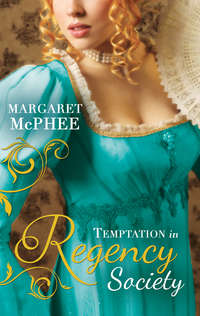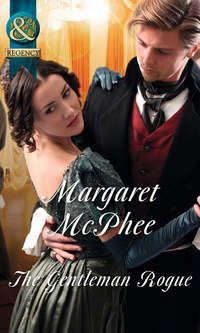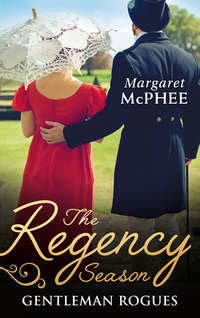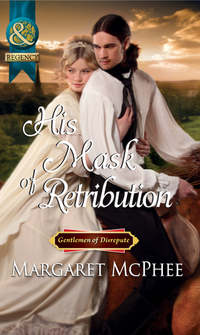
Полная версия
A Regency Captain's Prize: The Captain's Forbidden Miss / His Mask of Retribution
More voices, talking, and she raised her eyes to see five more shabby, dark-bearded men coming out from among the bushes. They were all lean to the point of being gaunt, their clothes dirty and faded, their faces hard and hostile as they encircled her, like wolves closing in around a kill. Bandits, realised Josie, just as Dammartin had warned.
‘Inglês,’ she said hoarsely, and raked through her brain for some more Portuguese words that would make them understand. ‘Não francês.’
But the men were talking quietly among themselves, gesturing in the direction of the French camp.
‘I am British,’ she said, swallowing through the pain of the bruising on her throat. ‘British,’ she said, and tried to scramble to her feet.
The large man, her attacker, pushed her back down and crouched low to look into her face. ‘I like British,’ he said, and traced a thick tongue slowly and deliberately over his lips in a crude gesture that even Josie in all her innocence could understand.
‘General Lord Wellington will pay well for my return,’ she lied. ‘W-e-l-l-i-n-g-t-o-n,’ she said enunciating slowly so that they must be sure to understand, and ‘g-o-l-d, much gold.’
But the bandit just leered and spoke words to the men behind him to make them laugh. He spat and something brown and moist and half-chewed landed close to her leg.
Josie’s heart was racing and fear flowed icy in her veins at the realisation of her situation. She skittered back, driving her heels against the ground, trying to put some space between her and the bandit, but he grabbed hold of her ankle and with one wrench, she was flat upon her back with the man climbing over her. She kicked and punched and tried to scream, but his mouth was hard upon hers, the unwashed stench of him filling her nostrils, the weight of him crushing her down upon the rocky soil so that she was staked out, unable to move. His hand ranged over her, rough and greedy and grasping, ripping aside her bodice, tearing at her petticoats and shift. She bucked beneath him, trying to throw him off, but he smiled all the more, and she felt him pressing himself against her, forcing his brown-stained tongue into her mouth. The foul taste of him made her gag, but he did not stop, not until she bit him. He drew back then, his face contorted, his filthy hand wiping the blood from his lower lip.
‘Bitch!’ he cursed, and lashed out, slapping her face hard.
The men behind him were saying something, looking back nervously towards the dragoons’ camp.
Josie knew she had only one hope. She prayed that Dammartin would come, and unleash all of his darkness, and all of his fury, upon these bandits. I do not lose prisoners, he had said. In her mind she called out his name again and again, as if that mantra would summon the devil to deal his revenge and save her.
But the bandit’s hands were at her skirts, bunching them up, ripping at them, clawing to reach beneath so that she could already feel his ragged fingernails raking the soft skin of her thighs. The others gathered closer to watch, smiling with lust, and cruelty and anticipation.
Josie’s hope weakened and began to wither, and just as it had almost died, she heard the French war cry, and knew that Dammartin had come.
Dammartin saw the ruffians gathered round, and he knew without seeing what they were watching. He signalled to his men, sending Molyneux and a trooper silently through the undergrowth to cover one side, and Lamont with a second trooper to the other. And even while they moved into place, he was priming his musket ready to fire.
He roared the war cry, the sound of it echoing throughout the hills and down across the ravine.
The bandits reacted with a start, some reaching for their weapons, the others trying to run.
He saw the flash of exploding gunpowder and the shots rang out, deafening in their volume. Three of the bandits were downed, but Dammartin was not focusing on them. He looked beyond to where the man was scrabbling up from a woman’s prostrate body, saw him snarl at her as he turned towards Dammartin, his hands raised in the air in submission.
‘Surrender! Surrender!’ the bandit shouted in garbled French.
Dammartin did not even pause in consideration. His finger squeezed against the trigger, and the man dropped to his knees, a neat, round, red hole in the middle of his forehead, his eyes wide and staring, before he crashed facedown to the ground.
When Dammartin looked again, Josephine Mallington was on her feet, clutching what was left of her bodice against her breasts, and standing over the bandit’s body. She was staring down at the gore the dripped from his head, her breast heaving, her eyes flashing with barely suppressed emotion.
‘Villain!’ she shouted, ‘Damnable blackguard!’ and delivered a kick to the dead man. ‘Rotten evil guttersnipe!’ Dropping to her knees, she lashed out, hitting again and again at the body. ‘Wretched, wretched brute!’
‘Mademoiselle,’ Dammartin said, and tried to guide her from the corpse, but she just pushed him away.
‘No!’ she cried. ‘Leave me be!’ She struck out all the harder.
‘Josephine.’ Dammartin stayed her flailing arms, pulling her up, turning her in his encircling arms so that her face looked up to his.
And all of her anger seemed to just drop away, and in its place was devastation. Her eyes met his then, wide and haunted. Beneath the smears of dirt, her face was so pale as to be devoid of any colour, save for beginnings of bruises where a fist had struck, and the thin trickle of red blood that bled from the corner of her mouth.
‘He was going to…’
‘I know.’ Dammartin felt his outrage flare at the thought.
‘Like a rutting animal…’ And her voice was hoarse with distress and disgust. ‘Like a great, filthy beast.’
‘Josephine—’ he tried to calm her ‘—he is dead.’
‘And I am glad of it!’ she cried in her poor, broken voice, ‘So very glad! Me, a Christian woman, my father’s daughter.’ Her eyes squeezed shut and he thought that she would weep, but she did not. Her head bowed so that she stood, resting her forehead lightly against his chest. And he could not imagine the strength with which she held back her tears. Within his arms, he felt the rapidity of her breathing and the tremble that ran through her.
‘I prayed that you would come,’ she said so quietly that he had to strain to catch her words. ‘I prayed and prayed.’
Dammartin stroked a gentle hand against her hair, and held her to him. ‘You are safe now, mademoiselle,’ he said, ‘safe, I promise.’
He stood for a few moments and the wind blew, and the sky grew darker, and he was overwhelmed with the need to protect her, to make all of her terrible hurt disappear. And then Molyneux moved, Lamont cleared his throat, and Dammartin forced himself to think straight.
‘Mademoiselle Mallington,’ he said softly, and stripping off his jacket, wrapped it around her. ‘We must return to the camp.’
She focused down at the ground. ‘Of course.’ There was nothing left of resistance, nothing of the fight she had so often given in the past.
He kept his arm around her waist, supporting her, as she walked by his side.
In silence and with grim expressions upon each of their faces, Dammartin and his men made their way back to their camp.
Dammartin sat her down on the chair at the table within his tent, speaking fast words of command over his shoulder, to Molyneux or Lamont, she supposed, but she did not look to see. She could not, for all that her eyes were open and staring. She was frozen, unable to move from beneath the terrible, heavy emptiness that weighed her down.
There was the trickle of water, a cloth being wrung out over a basin. The water was warm, his touch gentle, as he cleansed away the blood and the dirt, carefully wiping and dabbing and drying her face and hands, while his jacket hung warm and protective around her shoulders.
She looked at him then and there was nothing of bitterness in his eyes, only compassion.
‘I told him I was British,’ she said, and the words crawled like glass through the rawness of her throat. ‘And it made no difference, just as you said.’
‘Josephine,’ he said softly. ‘I should have guarded you better.’
She shook her head. ‘I was not escaping.’ It seemed important to make him understand and she did not know why. ‘I just wanted some time alone, some place where I might sit and think of all you had said…of my father.’
They sat in silence and the flicker of the lantern danced shadows upon the canvas walls. Outside all was quiet.
She felt the touch of his fingers, as light as a feather, against the bruising at her throat and the tenderness of her mouth.
‘He hurt you very badly, mademoiselle—for that I am sorry.’
And his gentleness and compassion almost overwhelmed her.
‘But you are safe now, I swear it.’
She looked deep into the darkness of his eyes, and saw a man who was resolute and strong and invincible, and she believed what he said.
The smallest of nods. And she sat there, dazed and battered and not knowing anything any more.
And when he unlaced her boots to ease them from her feet, and laid her down upon the bed beneath the blankets, she let him.
‘Do not leave me alone,’ she heard her lips murmur.
He gave a nod and returned to sit upon the chair. ‘I will be here all the night through. You can sleep safe.’
She could hear his breathing, the creak of the chair at his small movements, and every so often she opened her eyes just by the slightest to check that he was still there. Checking and checking until finally the blackness of sleep stole over her.
But sleep brought no refuge, only more horror, so that she could smell the stench of the villain and feel the claw of his hands upon her, and hear again the thunder of Dammartin’s musket shot. The wound in the bandit’s skull gaped, leaking the dark, rich liquid to drip into an expanding pool. So much blood. Just like in Telemos.
Blood and more blood. Upon the bandit, upon the men of the 60th and her father, upon herself as she hit out at the bandit’s dead body. One blow and then another, and as she reached to strike him a third time the bandit sat up with an evil grin. She felt her heart flip over, for in his hand was the musket that had shot her father, all sticky and dark with blood. The barrel raised, the bandit took aim directly at Josie’s heart. Death was certain. She cried out, pleading for him to stop.
‘Mademoiselle Mallington. Josephine.’ Dammartin’s voice was close and quiet, his hands on her arms, dragging her from the nightmare. She stared through the darkness, reaching out to find him.
‘Captain Dammartin,’ she whispered, and on her tongue was the saltiness of tears and in her nose was the congestion of weeping.
‘It is a bad dream, nothing more. I am here. All is well.’ He stroked a hand against her hair. ‘Go back to sleep.’
But when he would have left, she caught at his fingers, unable to bear being alone. ‘Stay,’ she said.
He stilled in the darkness.
‘Please.’
In answer he lay down beside her, and covered them both with the weight of his greatcoat. He was warm even through the blankets that separated them and she could feel the linen of his shirt soft against her cheek and smell the clean, masculine smell of him. With his strong arm draped protectively over her, holding her close, the nightmare receded and Josie knew, at last, that she was safe.
As Dammartin rode the next day his thoughts were all with Josephine Mallington. She had been seconds from being raped. In his mind’s eye he could still see the bandit lying over her, and the memory made his blood run cold so that he wanted to smash the butt of his musket into the man’s face again and again. Death had come too quickly for the bastard.
He remembered her anger, and her devastation, and the way she had clung to him in the night. I prayed that you would come, she had said. Him. Her enemy.
And he thought of Lieutenant Colonel Mallington firing the shot into his father’s body, just as he had thought of it every day for over the last eighteen months. She was the murderer’s daughter, his flesh and blood. He had every right to hate her, but it was no longer that simple. She had not known of her father’s crime, and she did not deserve what had happened to her, not in that room in Telemos, not his contempt, nor the assault by the bandits. Lamont had been right. She was a woman, a woman who had watched her father die, who was alone and afraid and the captive of an enemy army.
But there was still the matter of what Mallington had done, and Dammartin could not forgive or forget. The wound ran too deep for that. If he could have understood the reasons underlying Mallington’s crime, perhaps then there might have been some sort of end to it all, a semblance of peace. But Mallington had died taking his answers to the grave, leaving Dammartin with his anger and his bitterness… and his desire for Josephine Mallington.
As Lamont had said, it would be a long way to Ciudad Rodrigo, a long way indeed.
Josie rode silently by Molyneux’s side that day. The Lieutenant had been kind and understanding, trying to make the journey as comfortable as he could for her, but she could see that he did not know what to say to her. Even Sergeant Lamont had brought her a cup of hot coffee when they stopped to rest and eat, his gruff expression belying the small kindness. She could see the way they looked at her, with pity in their eyes, and Josie hated it. Their contempt would have been more welcome. She did not want to be vulnerable and afraid, an object of sympathy, and she resented the bandit even more that he could have made her so. And she knew what the bandit would have done had not Dammartin arrived.
Saved by the one man she had hated. It was under his command that her father and his men had been killed. He could be nothing other than her enemy. But Josie thought of the hole that his bullet had made within the bandit’s head, she thought of how he had taken her in his arms and held her. He had washed away the dirt and the stench and the blood, and stayed with her the whole night through, and lain his length beside her when she had begged him to stay. She had begged him. And that thought made Josie cringe with shame, yet last night, in the darkness the fear had been so very great that there had been no such embarrassment. Last night she had needed him, this man who hated with such passion.
Your father was a villain and a scoundrel, he had said, and she thought again of the terrible accusation he had made. Dammartin believed in it with all his heart. And she wondered why he should ever have come to think such a thing. How could he be so misled? There was only one man who could answer her questions.
Yesterday she would not have considered entering into a discussion with Dammartin over his accusation, but much had changed since then, and she knew that, for all the darkness and danger surrounding him, he would not hurt her. For all else that Dammartin was and for all else that he had done, he had saved her, and Josie would not forget that.
She rode on in silence, biding her time until evening when she would speak to the French Captain.
Chapter Seven
It had been a long day, long and cold and hard, and the dust of it still clung to Dammartin’s boots. Smoke drifted from the newly lit fires and the men busied themselves with cooking pots and rice and beans. The air was filled with the smell of wood smoke and the damp air of impending night.
‘We head for Sabugal tomorrow,’ he said to Lamont. ‘The maps show that the mountains do not grow less and Foy is demanding we speed our current pace.’
‘Men will be lost if we push them too hard.’
‘More of Massena’s men are lost with every day that we delay.’ Dammartin rubbed wearily at the dark growth of stubble that peppered his jaw. ‘Our army is dying in this damned country for need of reinforcements.’
Lamont’s gaze focused over Dammartin’s right shoulder before swinging back to meet the Captain’s. ‘I think perhaps the mademoiselle wishes to speak with you. She keeps glancing over here.’
Dammartin’s expression remained unchanged. ‘I am busy. There remains much to be done this evening.’ He had no wish to speak to Mademoiselle Mallington. Matters concerning the girl were already too complicated for his liking.
Lamont sniffed and scratched at his chin. ‘After last night, I thought…’
Dammartin forced the images from his mind. ‘I would not wish what happened last night upon any woman, but she is still Mallington’s daughter, Claude. I cannot allow myself to forget that.’
Lamont said nothing for a few moments, just looked at his captain before giving a nod. ‘I will see to our evening meal.’ And he walked off.
Dammartin nodded over at Molyneux, and began to move towards his lieutenant. A woman’s step sounded behind him and there was the scent of lavender.
‘I wondered if I might speak with you, Captain Dammartin.’ There was a slightly awkward expression upon Mademoiselle Mallington’s face; she seemed almost embarrassed, and he knew that she was remembering last night, just as he was.
He opened his mouth to refuse her, noticing as he did the tendrils of fair hair that had escaped her bonnet to feather around her face and the shadow of the bruise that marked her jaw.
‘Concerning my father.’
Mallington. And he knew he would not refuse her after all. ‘Very well, mademoiselle.’
‘Perhaps we could talk somewhere more private.’
He felt the register of surprise, along with a sliver of excitement at the prospect of what it could be that she wished to tell him.
‘If that is what you desire.’
He saw Molyneux standing not so far away, the Lieutenant’s gaze darting between the girl and Dammartin.
‘There is a river down through the woodland.’
She nodded her agreement.
Dammartin headed towards the trees, leaving Molyneux staring after them.
They walked in silence through the woodland, down the slope that ran towards the river, with only the tread of their boots over soil and the snapping of twigs between them, until they left the clearing where the 8th Dragoons were camped some distance behind at the top of the gorge. Slightly to the east they could hear the sounds of the infantry’s camp, but it was not close enough to challenge their privacy.
He led her to the edge of a fast-flowing river, to where great boulders of rock clustered along its bank.
‘We shall not be overheard here,’ he said, and, leaning easily against a giant rock, looked out over the river.
Back up through the trees, from where they had come, he could just about see the carmine-coloured lapels of his men’s jackets as they moved about the camp. Had the red lapels not been there, the green of their uniform would have made an effective camouflage even though the woodland was bare and barren. Beyond the great stones the water flowed fast despite the lack of rain. In the fading light it was a deep greeny grey that foamed to white where the water splashed hard over its rocky bed. The noise of it was so loud and gushing as to be almost a roar.
Josie turned from the river to face him, feeling suddenly nervous. ‘There is not much time, Captain Dammartin. The daylight shall soon be gone and I would prefer to be back at the camp before it is dark.’ She took a deep breath, squared her shoulders and prepared to speak the words she had come here to say.
He did not look round, just stayed where he was. ‘You are recovered from last night, mademoiselle?’
The question unsettled her, reminding of things best forgotten: bandits and nightmares and the warmth of Dammartin’s body sharing her bed. ‘Yes, thank you, sir.’
His eyes met hers, and they were a clear honey brown, rich with emotion that she could not name—compassion, affinity, protectiveness. ‘I am glad.’
And to Josie there was an intensity about the moment that set the butterflies fluttering in her stomach so that she had to look away.
The water rushed on. Somewhere in the distance was the thumping of axes splitting wood, and through the trees ahead she could see the sun was setting: a vibrant red halo surrounding the dark branches of the trees, as if a fire had touched against them, deep and hot and burning.
Still leaning his elbows on the stone boulder with the rosy pink light softening his face, he appeared to Josie ruggedly handsome. ‘What is it, then, that you wish to say?’
She turned her mind from its observations, reminding herself of why she had come here. ‘I wished to ask you of this…this accusation that you level at my father.’
He resumed his study of the river scene before him. ‘It is no mere accusation, mademoiselle, but the truth.’ And there was a weariness in his voice.
‘That is your belief, but it is not correct, sir.’
‘And this is what you wished to tell me?’ He stopped leaning against the rock and turned to face her, and she could see that anything of softness had vanished, that he was once again the dark and dangerous French Captain who had stormed the monastery in Telemos.
‘I did not come here to argue,’ she said quickly.
‘Really?’ He arched an arrogant eyebrow.
She glanced away, suddenly very aware that they were alone down here. ‘Did you witness your father’s death?’
There was only the sound of the river in reply.
She thought she saw the flicker of pain in his eyes, so brief that she could not be sure.
The muscle in his jaw clenched. ‘I did not.’
‘But you were there, with him, at Oporto?’
‘Unfortunately, no.’
The smallest of pauses, before she asked gently, ‘Then how do you know the manner of his death?’
‘Mademoiselle,’ he said with the hard cynical breath of a laugh, ‘all of France knows what your father did to him!’
She bit back the retort that sprang to her lips. ‘Then, there were witnesses…to the crime?’
‘Yes, there was a witness,’ he said harshly. ‘An honourable man who is beyond reproach, if it is his word that you are seeking to discredit.’
His words stung at her. ‘What is there of honour in dishonesty?’ she replied.
A twig snapped close by, and Josie jumped. Both of them peered in the direction of the trees from whence it had come.
There was only silence and the dying light and stillness.
‘It is nothing,’ said Dammartin dismissively. ‘There is nothing to be gained in this, mademoiselle, we should return to the camp. The light begins to fade, and you said yourself that you are in a hurry to be back there.’ He made to move.
‘No, wait.’ She stepped forwards, blocking his path, needing to show him that he was wrong. ‘Before he died my father told me that you were an honourable man. He bade me trust you. If your accusation is true, I do not understand why he would say such a thing. When he saw you…when you came into that room in the monas-tery…when it was all but over, there was nothing of guilt or regret or fear in his eyes. He looked at you with respect. Given what you say, sir, how do you explain that?’
‘I cannot, but it does not mean that he was innocent.’
‘But will you not at least admit that his was not behaviour in keeping with a man that is guilty?’
‘It was not in keeping with what is expected of a man that is guilty,’ said Dammartin carefully.
‘He was dying, for goodness’ sake!’ she said, and the pain stabbed in her heart. ‘Do you really think that he would have bothered with pretence at such a time? What would have been the point?’
‘As you said, Lieutenant Colonel Mallington was dying, and leaving his beloved daughter alone with the son of the man he had murdered. I think he had every reason to behave as he did.’
‘You did not know him,’ she said quietly, and stared up into his now-shadowed face. ‘He was not such a man.’
‘You are his daughter. Of course you do not wish to believe the unpleasantness of the truth.’








